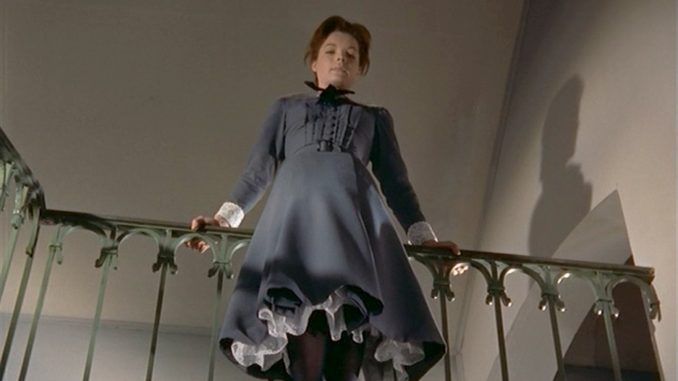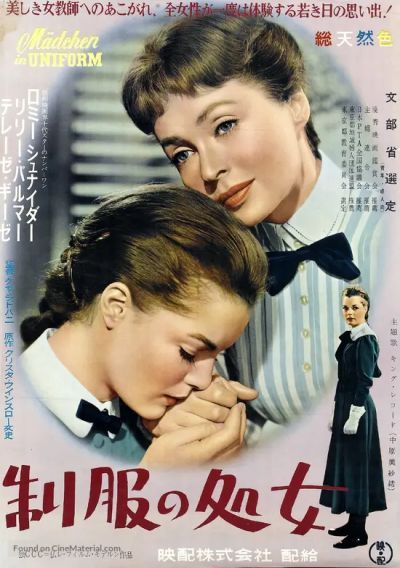
Rating: C+
Dir: Géza von Radványi
Star: Lilli Palmer, Romy Schneider, Therese Giehse, Blandine Ebinger
This is a remake of a rather notorious 1931 film of the same name, which is now seen as a cornerstone of lesbian cinema. I wonder if anything happened in Germany between the original film and this version? It may explain the differences in approach present reportedly here (not having seen the original, I do have to rely on other sources), with the teacher-pupil relationship at its centre, accompanied by a healthy dose of scepticism regarding authoritarianism. Though oddly, when Joseph Goebbels banned the original film, Wikipedia says it “was not so much about the lesbian theme of the film, but rather the depictions of Prussian ruthlessness and the criticisms on authority and discipline.” Rather prescient for 1931.
The attitude here is clear from the spiky Gothic font used in the opening credits, and Manuela von Meinhardis (Schneider) arrives at the school where she’s being boarded, after the death of her mother. It’s certainly a harsh establishment under the control of its headmistress (Giehse), prone to pronouncements that what young girls need “is discipline, order and hardening, not a life of luxury and sentimentality.” If you can imagine a school run by the Borg, you’re probably not far wrong. Poor, sensitive Manuela is left thrashing around for any source of affection, and her emotions alight on teacher Elisabeth von Bernburg (Palmer), who is simply ‘not unkind’. Seems Manuela isn’t the first pupil at the school with such inclinations either.
 Things will happen when you coop up hormonal teenage girls in close proximity, without any outlet. Especially when – and I’m really not sure who thought this was a good idea – you decide to put on a performance of Romeo and Juliet, with an all-female cast. Then serve punch spiked with alcohol to the students at the after-performance soiree. What could possibly go wrong? If you answer, Manuela confessing her love for Ms. von Bernburg, then collapsing on the floor, give two points to House Sappho. Yeah, it’s all rather fraught, the suppressed and smouldering sexuality frequently teetering on the edge of hysterical. I think I prefer the lighter tone of Passion Flower Hotel, which acknowledges the ludicrous nature on the way to its own spiked punch.
Things will happen when you coop up hormonal teenage girls in close proximity, without any outlet. Especially when – and I’m really not sure who thought this was a good idea – you decide to put on a performance of Romeo and Juliet, with an all-female cast. Then serve punch spiked with alcohol to the students at the after-performance soiree. What could possibly go wrong? If you answer, Manuela confessing her love for Ms. von Bernburg, then collapsing on the floor, give two points to House Sappho. Yeah, it’s all rather fraught, the suppressed and smouldering sexuality frequently teetering on the edge of hysterical. I think I prefer the lighter tone of Passion Flower Hotel, which acknowledges the ludicrous nature on the way to its own spiked punch.
I did like the performances though. Schneider appears to have been deliberately playing against type, being then best known for the Sissi trilogy of biopics about Empress Elisabeth of Austria – the first of which was seen by over 20 million people in Germany. Switching to this kind of angsty, sexually charged (by 1958 standards) drama must have been a shock to her fans. Palmer does well too, as a teacher trying to avoid cruelty, but who seems blithely unaware of the effect she has on her charges. While there are some pacing issues – a needless visit from a Princess interrupts the flow – the best scene is near the end. with the rejected Manuela, making her way slowly around the school staircase, intent on throwing herself off the top (above). It proved more effective than I would have predicted.
